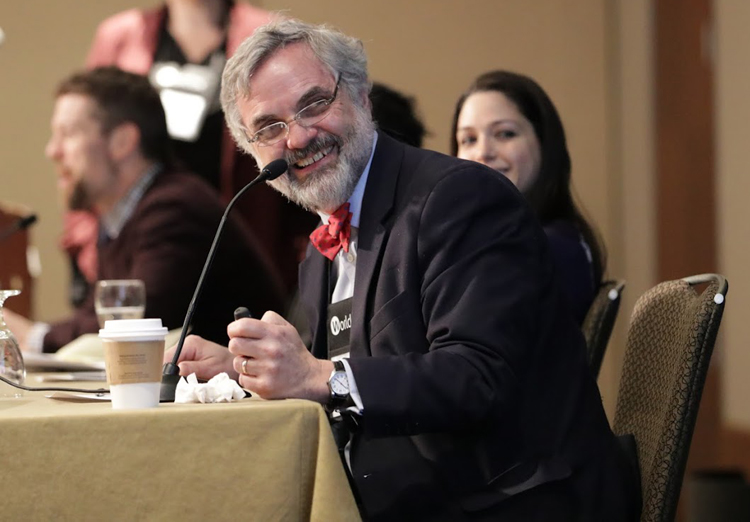Tech entrepreneurship features a shift in thinking at some law schools

Oliver Goodenough, a law professor at Vermont Law School and a co-director of its Center for Legal Innovation, gestures during the panel “Lawyer Entrepreneurship: Teaching Lawyers to Innovate and Disrupt” held Friday at the ABA Techshow in Chicago. (Photo by Saverio Truglia.)
Some skills used in technology entrepreneurship are contrary to what’s traditionally taught at law schools, but that may be changing, as the use of technology continues to grow in the practice of law.
A Friday morning panel discussion at ABA Techshow explored various ways that law schools get students interested in technology, while thinking about new ways to use it law practices. The panel, titled “Lawyer Entrepreneurship: Teaching Lawyers to Innovate and Disrupt,” included Jeannette Eicks, a research professor at Vermont Law School, where she co-directs its Center for Legal Innovation.
“I tell my dean that the doughnut is the legal industry, and bar jobs are the center. The hole is getting smaller and smaller, and the outside edges are getting bigger,” Eicks said. “What are we doing to help prepare students for a wider legal industry that has a lot of opportunity?”
Monica Goyal, another panelist, spoke about her experiences as an engineer in Silicon Valley and later as law clerk at a Canadian firm. The approach to problem solving, she said, was very different.
“In technology you spend three days to solve a problem, so you never had to do it again. Going from that to a law firm environment, it seemed like there were all these tools [to make things more efficient] and people were not making use of them,” said Goyal.
After law school she decided to start her own company, My Legal Briefcase, which focused on online document automation. She’s currently an adjunct professor at York University’s Osgoode Hall Law School, in Toronto, where she teaches legal technology courses. Her work includes giving students the skills to think about how they can build apps.
Sometimes when law schools teach legal technology there’s a focus on tech replacing attorneys, and that’s the wrong approach, said panelist Jeff Ward. He directs the Center for Law and Technology at Duke University School of Law.
“We want law to help technology to empower and enable people. We take that really seriously (at the center) and focusing just on jobs is too narrow for that,” Ward said.
In terms of entrepreneurship in technology, it helps if students have professors to emulate, said panelist Oliver Goodenough, a professor at Vermont Law School and a co-director of its Center for Legal Innovation.
The problem, he added, is that entrepreneurship does not count toward tenure requirements, which are heavily focused on writing.
“You get what you incentivize. Both the ABA Standards and the culture of legal academics promote this traditional, arcane approach to scholarship. It does not encourage entrepreneurship, and there are missing role models for students,” said Goodenough, referring to Interpretation 402.2 of the ABA Standards and Rules of Procedure for Approval of Law Schools. It states that “regularly engaging” in the practice of law, having an ongoing relationship with a law firm, or creating a business creates a presumption that someone is not a full-time faculty member.
Besides being a law professor, Goodenough is a co-founder of Skopos Labs, which he describes as a company that applies “vector-based machine learning techniques to high-value text analysis.” Its predictions focus on legislative and regulatory outcomes and relevance.
Kristen Sonday, a non-lawyer on the panel with startup experience, talked about law schools teaching critical thinking, and how to see risks. Entrepreneurship, she said, “flips that on its head.”
“It sees possibilities, and says ‘Why not?’ The strength of legal entrepreneurship is combining those mentalities, being open minded, and exploring possibilities that haven’t been explored before,” said Sonday, who with attorney Felicity Conrad co-founded Paladin, a platform that helps organizations manage, staff and track pro bono efforts. Both are 2017 Legal Rebels.
Corrected March 14 at 1:09 PM, to correct the name of Goodenough’s law school.
Follow along with our full coverage of the 2018 ABA Techshow



